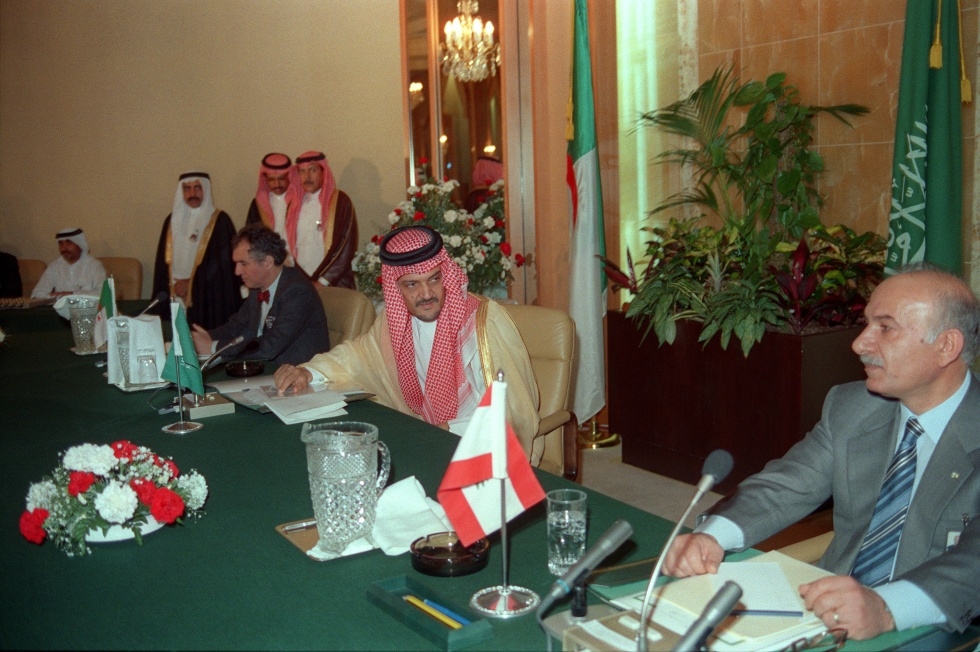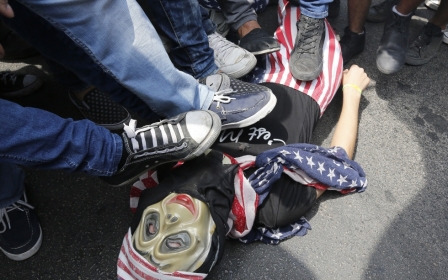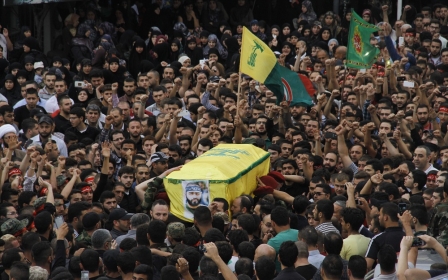
25 years of Taif
On 22 October, the Taif Agreement celebrated its quarter-of-a-century birthday.
Negotiated in the Saudi Arabian city of Taif in 1989, the agreement served as the basis for ending the 15 year-long Lebanese civil war. While there’s no doubt the accord deserves credit for putting a stop to mass bloodshed, it was in many ways an exercise in wishful thinking, starting with its introductory assertion that “Lebanon is a sovereign, free, and independent country.”
It’s a bit tricky, of course, to claim sovereignty for a country condemned to play perennial battleground for foreign powers, not merely during the civil war - a reality underscored by the fact that both Israel and Syria continued to occupy the place for over a decade after Taif.
Syria was even tasked in the agreement itself with “thankfully assist[ing] the forces of the legitimate Lebanese government to spread the authority of the State of Lebanon” over all Lebanese territories. This arrangement came equipped with the blessing of the United States, as well as – obviously - the kingdom that played host to the negotiations.
In his book “Pity the Nation: The Abduction of Lebanon”, veteran journalist Robert Fisk characterises the accord as having been “engineered by the Saudis to favour their Sunni Muslim co-religionists in Lebanon.”
And indeed, Taif did transfer various powers from the president, an office reserved for a Christian, to the Sunni prime ministerial post, while revising the ratio of Christians to Muslims in the parliament from 6:5 to half and half - with seats subsequently divided “proportionately between the denominations of each sect” and “proportionately between the districts.”
Beyond these convolutions, Taif prescribed an array of constitutional amendments and other measures, many of which have not been implemented, including ones pertaining to the information media, defence, parliamentary elections, and the creation of a senate.
The agreement also defines Lebanon as “Arab in belonging and identity,” though some Lebanese Francophiles and other self-colonising cohorts would still beg to differ.
Given the additional stipulation that the “president of republic is the head of the state and a symbol of the country's unity,” it is perhaps fitting that Lebanon has spent the past five-plus months without one.
That famous census
One of the major prescriptions contained in Taif is the “abolition of political sectarianism,” also known as confessionalism—the practice of allocating political and administrative posts according to religious sect, ostensibly using the size of each religious community as the basis for determination. In Lebanon, confessionalism can be traced back to the Ottoman period but was tacitly institutionalised in the National Pact of 1943 brokered by President Bechara al-Khoury and Prime Minister Riad al-Solh, which divvied up power, but favoured the Maronite Catholics.
In addition to the Maronites, Lebanon currently hosts 17 other recognised sects - among them Sunnis, Shiites, Druze, Greek Catholics, Armenian Orthodox, and so forth. The argument that the confessional system of allocation is capable of ensuring fair and proportional representation for the citizenry becomes more than slightly dubious when one considers that a national census has not been conducted since 1932.
Given that the Lebanese civil war had amply showcased the horrors of sectarianism, it’s not surprising that Taif pledged to do away with it. According to the document, this would first entail “[a]bolish[ing] the sectarian representation base and rely[ing] on capability and specialisation in public jobs, the judiciary, the military, security, public, and joint institutions, and in the independent agencies in accordance with the dictates of national accord, excluding the top-level jobs and equivalent jobs which shall be shared equally by Christians and Muslims without allocating any particular job to any sect.”
Needless to say, this has not been accomplished, although another, simpler step has: “Abolish[ing] the mention of sect and denomination on the [Lebanese] identity card.” This mention previously facilitated a particularly nefarious wartime phenomenon that saw motorists summarily slaughtered at checkpoints based on religious identity alone.
But there are other ways of figuring these things out, and the Lebanese are quite adept at sectarian identification by last name or place of origin. The change to the identity card is thus a cosmetic one that does nothing to alter traditional sectarian operating procedures.
For example, during the violent sectarian spasm of May 2008, a Lebanese acquaintance of mine in Beirut was attempting to walk home after gun battles in the street had kept him stranded at a friend’s place for several days.
He was detained en route by armed men from the Syrian Social Nationalist Party (SSNP), an ally of Hezbollah and opponent of the primarily Sunni Future Movement headed by then-soon-to-be Prime Minister Saad al-Hariri.
Though my friend is not at all religiously inclined, his last name happens to belong to a prominent Sunni family, something the gunmen quickly ascertained after demanding his ID. His predicament was only exacerbated when they then discovered a phone card in his wallet bearing the picture of assassinated former Prime Minister Rafik al-Hariri, father of Saad.
Not enormously impressed with my friend’s suggestion that they take up the issue of phone card aesthetics with the minister of telecommunications, the gunmen debated handcuffing him and storing him in a room for further interrogation but eventually escorted him home, where my friend consumed a bottle of whiskey and made plans to study abroad.
Institutionalising sectarianism
I witnessed first-hand the sectarian reductionism of May 2008, having arrived to Lebanon a few days prior to the onset of the crisis.
Driving south from Beirut with a Palestinian-Lebanese friend, we had to navigate an obstacle course of burning car tires and contingents of Druze men who descended upon the car with the menacing question for my companion: “Sunni or Shiite?”
In this case, Sunni was the proper answer, and my friend was able to present the men with the evidence they needed: his Palestinian refugee passport.
In reality, my friend is the son of a Shiite mother from south Lebanon and a Palestinian father, but the passport identifies him as Sunni - because that is the only sectarian option available to Palestinians.
Which brings us to yet another pernicious effect of the confessional system: in the interest of preserving the so-called confessional “balance,” approximately half a million Palestinians - even those who have resided in Lebanon for over 60 years - are denied citizenship and attendant civil rights in Lebanon.
Instead, they are sentenced to life in eternal limbo, often in squalid refugee camps. Unsurprisingly, such locations are sometimes viewed as ideal operating grounds by Sunni jihadists - both local and foreign - committed to inciting hatred of the Shiites.
In the end, you’d need some seriously impaired vision to deny the correlation between political sectarianism and civil conflict.
And while the Taif Agreement promised to abolish the arrangement, it actually did the opposite. Hassan Krayem, currently a governance program manager for the United Nations Development Programme in Lebanon, has described the agreement as transforming the National Pact “into a formal constitutionally written document.”
Krayem notes that, “just like the old formula of 1943, this confessional formula leaves the door open to the renewal of conflict, and increases the possibilities of its occurrence.”
Let’s ponder the logic of an accord that purports to do away with confessionalism in the long-term by reinforcing it in the short-term: it’s kind of like distributing weapons to every country in the world and claiming that the goal is global disarmament. It simply makes no sense.
And things certainly aren’t improving. Last year, 24 years after Taif, legislation referred to as the “Orthodox law” was approved in a parliamentary committee; if enacted, it would prohibit citizens from voting outside their official sect.
If we want to continue analogising, this is somewhat akin to decreeing that black people must vote for black people and whites for whites.
So much for the stipulation in the Taif Agreement that “[t]he people may not be categorised on the basis of any affiliation whatsoever.”
Yes to civil strife, no to civil marriage
The unavailability of the option of a secular, non-sectarian identity in Lebanon is particularly apparent in the realm of matrimony, with the country’s first civil marriage in history being registered only last year - and only after a protracted battle.
But don’t get your hopes up. A January 2014 Al-Akhbar English article translated from the Arabic quoted the former interior minister’s thoughts on the victory: “[T]o protect their rights and their children’s rights, spouses should not leave their religious communities pending a personal status civil law because there is no nineteenth sect in Lebanon.”
What this pronouncement emphasises is that the Lebanese state cannot be counted on as a guarantor of citizens’ rights, which means it technically shouldn’t even qualify as a “state” - unless, perhaps, you put the word “feudal” before it.
As for the feelings of religious leaders vis-à-vis the prospect of unreligious weddings, another translated al-Akhbar article quotes the reaction of the then-Mufti of Lebanon’s Sunni community, Sheikh Mohammed Rashid Qabbani: “[A]ny Muslim official, be they an MP or a minister, who supports the legalisation of civil marriage, even if it is optional, is an apostate and outside the Islamic faith.”
Back in 1998, during a previous push for civil marriage, former Maronite Patriarch Nasrallah Sfeir declared that such a practice would contravene the teachings of the church.
Okay, you might say, it takes time for systems to evolve. But when all facets of existence are approached from a sectarian standpoint, what’s the likelihood of change?
In an essay for The Yale Review of International Studies, Gülay Türkmen-Dervişoğlu brings up some findings of a 2010 poll by the Lebanese polling and market research firm, Information International.
According to the author, “[w]hen asked whether they support the abolition of confessionalism [as prescribed by Taif,] 24 percent of the participants surveyed in the… poll said that they did not know what ‘abolishing confessionalism’ even means.”
Fifty-eight percent were meanwhile in favour of abolition, with support varying greatly by sect. At least a portion of this support was presumably a result of calculations regarding prospective sectarian gains in the event of de-confessionalisation and a termination of the favouritism of certain groups that has until now been enabled by the wildly outdated census.
Türkmen-Dervişoğlu writes that “Lebanese nationalism seems like a distant utopia” but can be realised, provided “the impact of confessionalism [is] diminished drastically, if not abolished totally.”
But while the idea of a cohesive Lebanese national identity does indeed sound all harmonious and great, let’s not forget that nationalism itself has also been known to breed various pathologies, creating dividing lines between “us” and “them” much in the same way that sectarianism does.
Especially given the already widespread treatment of Palestinian and Syrian refugees in Lebanon as inferior creatures, it seems that a real “utopia” would be one in which empathy spanned arbitrary divisions between human communities.
Hijacking class solidarity
Luckily for the class of human that benefits from such divisions, there are various ways to curb empathy.
Take, for instance, the pre-civil war years in Lebanon, when, as Krayem details, vastly uneven economic growth and regional development led to increased migration from rural areas into poverty belts around Beirut, intensified societal polarisation, and fuelled an upsurge in protest movements.
Krayem remarks:
“These socially-oriented movements strengthened class solidarity and introduced class identities that challenged traditional identity patterns based on religion, tribe or region. Indeed, social identity patterns were developing along horizontal class lines, but this development was aborted by the outbreak of the civil war and quick reaffirmation of rigid sectarian divisions and identity patterns.”
Although the Lebanese National Movement - one of two main camps at the start of the war - advocated for the eradication of confessionalism, plans for comprehensive political reform were eventually discarded.
A more recent example of sectarian hijacking of potential class - and cause-based solidarity is the bloodshed of May 2008. Although media analysis of the period generally devolved into the argument that this was straight-up sect-on-sect warfare over whether or not Hezbollah should be permitted to retain certain capabilities (which, it bears mentioning, were largely to thank for defending the country against Israeli predations), the truth of the matter is that there was also a socioeconomic aspect to the conflict.
What directly precipitated it, after all, was a general strike called by trade unions to protest low wages and soaring prices. IRIN, the humanitarian news and analysis service of the United Nations Office for the Coordination of Humanitarian Affairs, reported at the time that, “[a]ccording to [Lebanon’s] consumer association, prices [had] risen by 43 percent over the past 21 months.”
IRIN quotes professor Rami Zurayk of the American University of Beirut’s Department of Land and Water Resources on the domestic factors contributing to the crisis, such as post-civil war economic mismanagement by the government, which simply exacerbated national inequality, and a failure to invest in productive sectors like farming.
Postwar projects included the construction of an ostentatious downtown that is financially and often physically off-limits to the majority of the Lebanese. Meanwhile, other sections of the city and country have suffered infrastructural neglect and a comparative lack of services and employment opportunities - despite Taif’s pledge to pursue “[c]ulturally, socially, and economically-balanced development.”
Approximately one-fourth of the Lebanese population currently lives under the poverty line, with the poverty rate exceeding 50 percent in some places.
Socioeconomic oppression, in turn, reinforces sectarianism and consolidates elite power. As Zurayk puts it: “Bad economics produces a situation in which politicians become powerful, because you have to hide behind a sect, a leader, and become a client in order to survive.”
But the fact that “bad economics” are so often viewed through a sectarian lens means that proper blame is rarely assigned and is instead directed onto opposing sects rather than the oppressive system as a whole. As you might expect, this mentality only further fortifies the system - while also letting neoliberalism off the hook for its domestic financial depredations.
The profitability of dysfunction
The May 2008 strike was endorsed by Hezbollah and its allies - Muslim and Christian - who constituted the opposition to the US-backed government of Sunni Prime Minister, Fouad al-Siniora.
IRIN quoted a pro-Hezbollah protester named Mahmoud on ensuing sectarian allegations: “Every time we protest about price rises and low wages, or the policies of this government that's on Western life-support, we’re told we're stirring Sunni-Shia strife.”
If there’s one thing the political elite are desperate to conceal from their constituents, it’s that, in the end, economically maligned folks might just discover that they have more in common with their economically maligned folks - including ones from other sects - than they do with their elite co-religionists-cum-self-appointed-saviours.
This would seriously complicate the traditional hobbies of the political class; after all, you can’t be a warlord if everyone gets along.
Hence the perpetual fear-mongering rhetoric and the cultivation of illusory existential dangers emanating from sectarian corners. The current regional proliferation of Sunni jihadists hallucinating themselves in a battle to the death with the Shiites obviously isn’t helping matters.
The fundamental problem, then, is that too many people stand to profit from the continuation of a dysfunctional system that is un-representative of its citizens. Sectarian dynasties flourish, dividing resources and spoils of the state, and international actors exploit the inherent instability that makes Lebanon so attractive as a proxy battlefield.
Given the numerous foreign noses that are forever stuck in Lebanese affairs, it’s no surprise that Taif was signed in Saudi Arabia, while the end to the May 2008 crisis was negotiated in Doha, Qatar.
In the latest joint pseudo-effort to assess Taif, a recent conference at Beirut’s upscale Phoenicia Hotel to honour the agreement’s 25th anniversary drew representatives of Lebanese political parties, religious figures, and international officials with such objectives as determining current national and international positions vis-à-vis the accord and whether it might be applied to other regional hotspots.
An article in Lebanon’s Daily Star newspaper quoted one of the organisers as pledging: “If this small step turns out to be on the right track, we will see how to move on to further steps.”
Will it ever end?
So, while “Lebanon and friends” contemplate in style whether or not to decide to make any decisions about Taif, is there any room for optimism?
In a March 2014 Daily Star interview, former parliament speaker and “father of the Taif Agreement” Hussein al-Husseini - who resigned from parliament in 2008 over foot-dragging in the implementation process - argued for the passage of an election law in-line with Taif’s stipulation that “[t]he people are the source of authority.”
A nice idea, no doubt, but one inherently at odds with the system of confessional quota system enshrined in the document itself.
A helpful assist to "the people" one day gaining their rightful authority would be implementing a clause in Taif that Lebanese “curricula shall be reviewed and developed in a manner that strengthens national belonging, fusion, spiritual and cultural openness, and that unifies textbooks on the subjects of history and national education.”
As it currently stands, the civil war is not taught in schools – a pretty good formula for not resolving anything ever.
To be sure, there are plenty of opponents of sectarianism in Lebanon, and Middle East commentator Karl Sharro contends that there is a “desperation of the ruling confessional class [that] signals the existence of real opportunity for change.”
In Sharro’s view, Lebanese confessionalism has, since 2005, been in a “perpetual crisis that has completely paralysed state institutions” and has resulted in a situation in which politicians “don’t have any more confidence [in] the malleability of the system in its current form to guarantee their share of power.” Case in point: the Orthodox law, which would require citizens to vote within their sect, and their sect alone.
Here’s hoping he’s right, but the only thing clear at this point is that Taif deserves a vote of no confidence.
New MEE newsletter: Jerusalem Dispatch
Sign up to get the latest insights and analysis on Israel-Palestine, alongside Turkey Unpacked and other MEE newsletters
Middle East Eye delivers independent and unrivalled coverage and analysis of the Middle East, North Africa and beyond. To learn more about republishing this content and the associated fees, please fill out this form. More about MEE can be found here.




